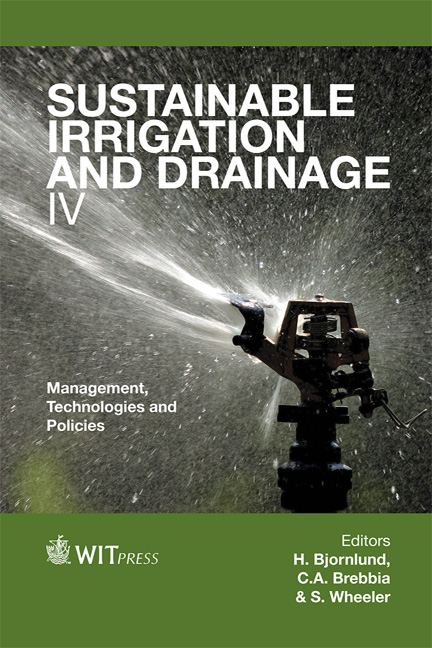Developing An Asset Management Plan For A Sustainable Future Indonesia Irrigation Systems
Price
Free (open access)
Transaction
Volume
168
Pages
15
Page Range
323 - 337
Published
2012
Size
765 kb
Paper DOI
10.2495/SI120281
Copyright
WIT Press
Author(s)
I. Kustiani & D. Scott
Abstract
Since irrigation systems in Indonesia are faced with the problem of performance and sustainability, especially in rural areas, it is imperative to implement a sustainable and cost-effective Asset Management Plan (AMP). This AMP enables irrigation authorities to utilize and maintain the condition of its assets in the best possible way; to be kept running at a good operating standard, and provide a level of service that is consistent with cost-effectiveness and sustainability objectives. The AMP framework was developed by integrating several methods. Initially, system performance was assessed through the internationally accepted method of Rapid Appraisal Procedure (RAP) and farmers’ opinion survey. This combination was chosen to provide a more in-depth assessment by analysing the farmers’ preferences so that the AMP framework can be developed with the elements to increase local support, co-operation, and benefit. Then, it was analysed further by adopting the Triple Bottom Line (TBL) principle to develop a sustainability framework. Finally, the AMP framework was built by utilising a modification of the method proposed by the Institute of Irrigation Studies (IIS) – University of Southampton and a participatory process in setting the level of service and timeframe of implementation. Performance of rural irrigation systems is generally poor. However, the farmers are quite satisfied with the current services yet they expect improvement in the future. The TBL framework indicates that the systems to be sustained require modernisation of the irrigation systems and better irrigation system management, procedures, and communication by improving participation in irrigation management. Eventually, the AMP framework incorporate Water User Associations (WUAs) to make more efficient use of irrigation water and costeffectiveness in maintaining the assets, especially at a tertiary level. Keywords: performance assessment, TBL sustainability framework, AMP.
Keywords
performance assessment, TBL sustainability framework, AMP.





